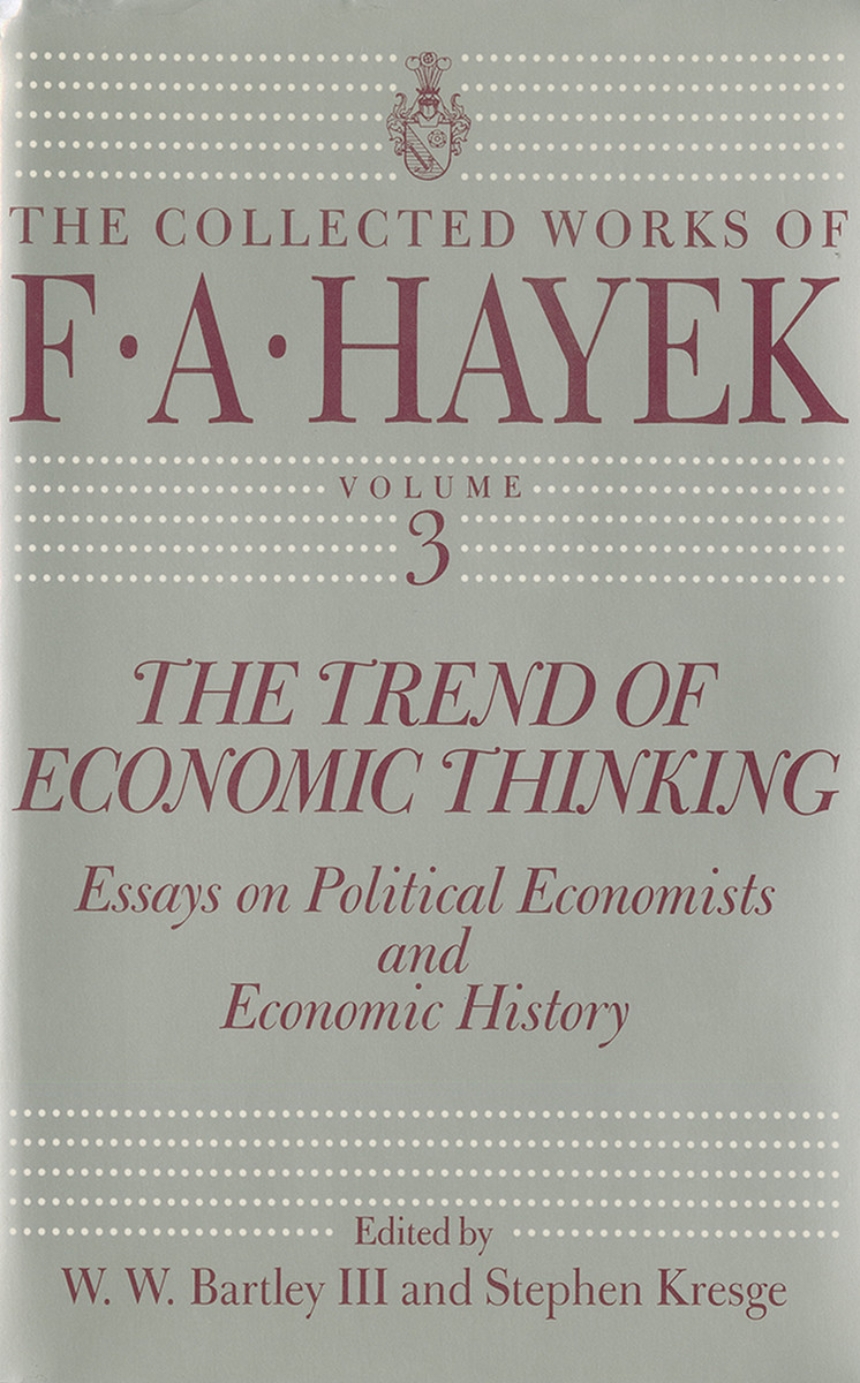The Trend of Economic Thinking
Essays on Political Economists and Economic History
The Iron Curtain has been cast aside. The Berlin Wall has fallen. Germany has been reunited. And F. A. Hayek’s forceful predictions of the inevitable failure of socialism and central economic planning are now rendered irrefutable. Yet Hayek still rightfully cautions us to heed his arguments, warning that "in economics you can never establish a truth once and for all but have always to convince every generation anew."
The Trend of Economic Thinking captures Hayek’s views on political economists and economic history—on Mandeville, Hume, Cantillon, Adam Smith, and Henry Thornton. Framed by insightful editorial notes, fifteen newly collected essays—including five previously unpublished pieces and two others never before available in English—provide a fascinating introduction to the historical context of political economy and the evolution of monetary practices. In a highlight of the collection, "On Being an Economist," Hayek reflects on the influence of economists, the time required for new ideas to take hold, the best way to educate economic theorists, and the need to follow one’s own interests, often in opposition to fashionable beliefs. As always, the words of this outspoken scholar are sure to provoke debate.
The Trend of Economic Thinking captures Hayek’s views on political economists and economic history—on Mandeville, Hume, Cantillon, Adam Smith, and Henry Thornton. Framed by insightful editorial notes, fifteen newly collected essays—including five previously unpublished pieces and two others never before available in English—provide a fascinating introduction to the historical context of political economy and the evolution of monetary practices. In a highlight of the collection, "On Being an Economist," Hayek reflects on the influence of economists, the time required for new ideas to take hold, the best way to educate economic theorists, and the need to follow one’s own interests, often in opposition to fashionable beliefs. As always, the words of this outspoken scholar are sure to provoke debate.
398 pages | © 1991
The Collected Works of F. A. Hayek
Economics and Business: Economics--General Theory and Principles
Table of Contents
Editorial Foreword
Introduction
Part I. The Economist and His Dismal Task
1. The Trend of Economic Thinking
2. On Being an Economist
3. Two Types of Mind
4. History and Politics
Part II. The Origins of Political Economy in Britain
5. Francis Bacon: Progenitor of Scientism (1561-1626)
6. Dr. Bernard Mandeville (1670-1733)
7. The Legal and Political Philosophy of David Hume (1711-1776)
Addendum: A Discovery about Hume by Keynes and Sraffa
8. Adam Smith (1723-1790): His Message in Today’s Language
Addendum: Review, Adam Smith as Student and Professor
Part III. English Monetary Policy and the Bullion Debate
9. Genesis of the Gold Standard in Response to English Coinage Policy in the 17th and 18th Centuries
10. First Paper Money in 18th-Century France
11. The Period of Restrictions, 1797-1821, and the Bullion Debate in England
12. The Dispute Between the Currency School and the Banking School, 1821-1848
13. Richard Cantillon (c.1680-1734)
Addenda: On Higgs
14. Henry Thornton (1760-1815)
Part IV. Currents of Thought in the 19th Century
15. Frederic Bastiat (1801-1850), Jules Dupuit (1804-1866), and Hermann Heinrich Gossen (1810-1858)
Chronological Order of Contents
Bibliographic Note
Editor’s Acknowledgements
Index
Introduction
Part I. The Economist and His Dismal Task
1. The Trend of Economic Thinking
2. On Being an Economist
3. Two Types of Mind
4. History and Politics
Part II. The Origins of Political Economy in Britain
5. Francis Bacon: Progenitor of Scientism (1561-1626)
6. Dr. Bernard Mandeville (1670-1733)
7. The Legal and Political Philosophy of David Hume (1711-1776)
Addendum: A Discovery about Hume by Keynes and Sraffa
8. Adam Smith (1723-1790): His Message in Today’s Language
Addendum: Review, Adam Smith as Student and Professor
Part III. English Monetary Policy and the Bullion Debate
9. Genesis of the Gold Standard in Response to English Coinage Policy in the 17th and 18th Centuries
10. First Paper Money in 18th-Century France
11. The Period of Restrictions, 1797-1821, and the Bullion Debate in England
12. The Dispute Between the Currency School and the Banking School, 1821-1848
13. Richard Cantillon (c.1680-1734)
Addenda: On Higgs
14. Henry Thornton (1760-1815)
Part IV. Currents of Thought in the 19th Century
15. Frederic Bastiat (1801-1850), Jules Dupuit (1804-1866), and Hermann Heinrich Gossen (1810-1858)
Chronological Order of Contents
Bibliographic Note
Editor’s Acknowledgements
Index
